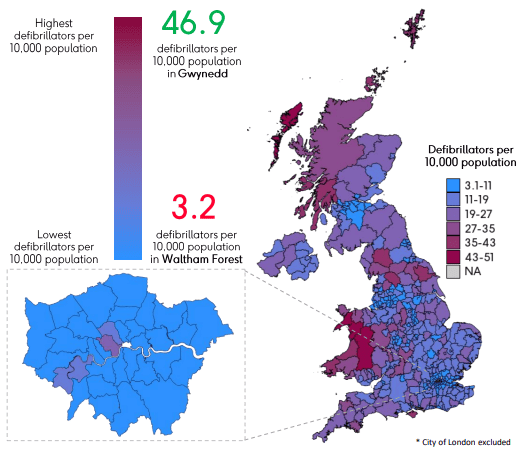The UK has suffered a series of traumatic emergencies in recent years, amplifying the need for civil emergency preparedness across response, recovery and ongoing community resilience.
The importance of sharing best practice to inform a holistic and integrated approach is vital at time when our emergency services are under significant pressure.
Defibrillators per 10,000 population visible to ambulance services

Preparedness for out of hospital cardiac arrests in your community
Maximising the lifesaving potential of existing assets
There is potential to transform your community’s emergency preparedness to improve survival from out-of-hospital cardiac arrests, by maximising the lifesaving potential of existing assets – defibrillators.
Each year, over 30,000 people have an out-of-hospital cardiac arrest in the UK. The survival rate for out-of-hospital cardiac arrests is less than one in ten.
Early use of a defibrillator with CPR can double the chance of survival.
The earlier a defibrillator is used the more likely the person is to survive. Research suggests that early defibrillation within three to five minutes could lead to a greater chance of survival, with the chance of survival reducing significantly for each minute that passes. However, ambulance service call handlers need to have visibility of the defibrillators in your community, to enable bystander defibrillation to start before the ambulance arrives.
Ensuring ambulance services can see your defibrillators
British Heart Foundation, Resuscitation Council UK, NHS England, St John Ambulance, and the Association of Ambulance Chief Executives worked with all fourteen ambulance services to develop The Circuit, the national defibrillator network.
The Circuit provides ambulance services with visibility of the nearest defibrillator. This helps emergency call handlers direct bystanders to their nearest defibrillator when 999 is called.
It takes less than five minutes to register a defibrillator, and there is no cost to register.
You can check if your communities’ defibrillators are registered going to DefibFinder website.
Over 90,000 defibrillators are already registered on The Circuit across the UK. However, it is estimated that tens of thousands of defibrillators are not registered. If they aren’t registered emergency call handlers can’t direct bystanders to them in an emergency. At a time when every second counts, a defibrillator could be nearby, but not used.
Defibrillator visibility and social deprivation
Across England 41 per cent of the most deprived areas have zero defibrillators registered whilst in Wales 24 per cent have zero defibrillators registered. Presenting an acute vulnerability in defibrillator visibility to ambulance services in the event of an out-of-hospital cardiac arrest, in locations where the risk is typically greater. This information can be drilled down to a more granular level to anticipate, assess and then reduce the risk by registration on The Circuit.
Emergency preparedness for out of hospital cardiac arrest
Index of Multiple Deprivation (IMD) and registered defibrillator distribution: Bi-variate analysis

This bi-variate analysis of IMD and number of defibrillators per 10,000 population highlights areas in which are underserved with defibrillators and deprived.
Making a difference through the registration of existing defibrillators
Unregistered defibrillators can be found across sports sites, community centres, businesses, and schools in your community. Embedding a call to register defibrillators within your emergency preparedness outreach and assessment activities will support you to enhance your response and resilience.
For example, if all schools in England were to register their defibrillators there would be a 19.1 per cent increase in the number of defibrillators visible to ambulance services in England. For Wales, if all schools had defibrillators and registered them there would be a 12.8 per cent increase in the number of defibrillators. This would also have a significant impact on the number of deprived areas with zero registered defibrillators falling by 16 per cent in England and seven per cent in Wales to 25 per cent and 16.8 per cent respectively.


- To find out more or to register your own defibrillators visit The Circuit or Join a 30-minute briefing session: Monday 24th June 1pm-1.30pm or Friday 28th June 1pm-1.30pm, email [email protected] subject: The Circuit briefing session.